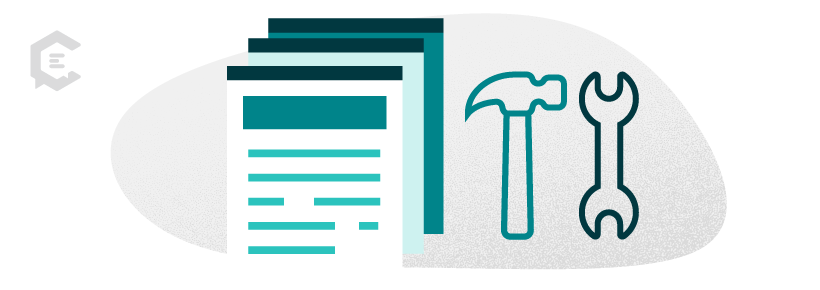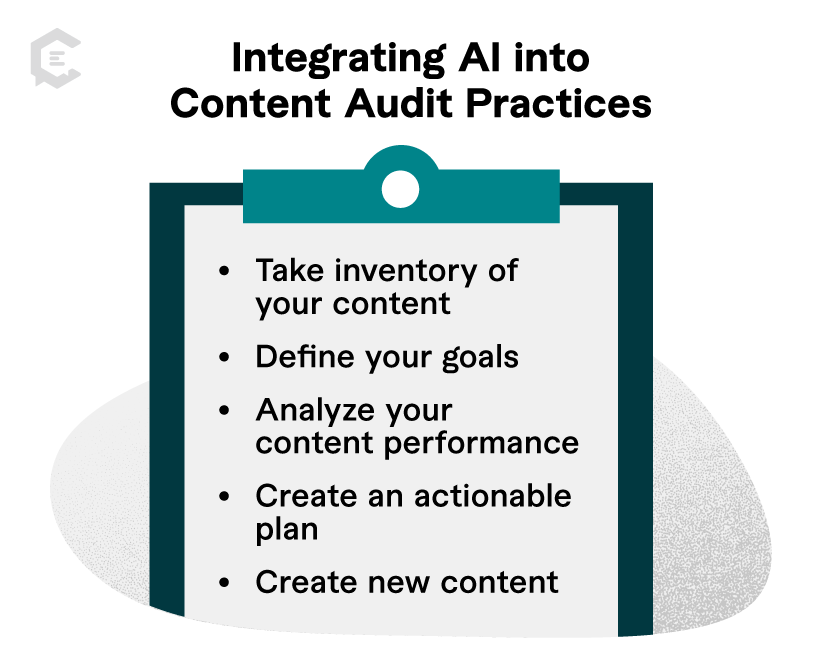Conducting a content audit of your website’s ability to attract organic traffic, drive conversions, and engage visitors helps reveal where your marketing strategy excels and what you need to improve.
However, when your website contains thousands of pages, manual content audits can take weeks or months. What’s more, human auditors can make mistakes and overlook content errors.
Fortunately, AI tools now make auditing faster and more accurate. In addition, AI-driven content audits can lead to improved insights that strengthen your business’s content marketing plan.
In this post, we examine AI’s role in content audits and how to integrate AI tools into your audits to make the process easier and more beneficial for your business.

How Does AI Apply to Content Audits?
AI tools automate the task of gathering data from multiple databases and spreadsheets, quickly gathering and organizing key metrics, including:
- Page views
- Bounce rates
- Social shares, likes, and mentions
- Keyword rankings
- Duplicate content
- Internal links
- Leads and conversions
AI can then unravel complex patterns in the information and reveal connections that go unnoticed by humans. For instance, based on competitor analysis, AI can suggest popular topics with a target audience.
AI tools can also present a consolidated view of the data on a single dashboard. This makes it easier for auditors to:
- Communicate their findings
- Place the data in context
- Show what types of content are meeting business goals
- Reveal where content growth opportunities should be explored
Benefits of Leveraging AI in Content Audits
Think of AI-powered content auditing tools as having a team of data analysts working tirelessly to support your auditors by providing analysis of the most up-to-date data on your content. This offers many benefits, including:
- Helping content creators produce high-quality content by supplying them with topics and keywords provided by AI
- Identifying existing articles that need updates, allowing you to produce more valuable content while retaining the article’s domain authority
- Alerting you to repair errors like broken links, duplicate URLs, and missing title tags that negatively affect user experience
AI-Powered Tools for Content Audits
AI tools can be used for many different purposes in content audits, including:
Automated Content Inventory and Analysis Tools
AI content inventory and analysis tools automatically analyze thousands of web pages on your site. These tools relay how many pages your website has, your content assets (documents, images, and video), the URLs the pages are located, and the links that go in and out of each page. Using these tools can save hours or even days of manual inventory.
Natural Language Processing (NLP) for Content Assessment
Natural language processing (NLP) combines machine learning models with computational linguistics to help computers understand written and verbal human language. This enables AI to analyze text and make insightful suggestions.
For instance, NLP can suggest content keywords based on exact matches of popular keywords and phrases and a semantic understanding of related terms. This makes it more likely that your target audience will use the keywords recommended when searching for your content.
NLP algorithms also reveal spelling and grammar errors, as well as tonal and style inconsistencies in content. This helps you create a more consistent brand voice across all your content, decrease your bounce rate, and increase your user dwell rate.
Integrating AI into Content Audit Practices
To integrate AI into your existing content auditing practices, take the following steps:
Take inventory of your content
Collect all your URLs and automatically export them to a spreadsheet with an AI tool like Screaming Frog. This tool is free if your site has fewer than 500 URLs.
Define your goals
Decide what you want to analyze in your content audit. Do you want to locate underperforming content? Determine which content is best for driving conversions. Find which keywords and topics attract the most organic traffic.
Different goals require different AI tools. For instance:
- Google Analytics is good for assessing user engagement by showing metrics for visits, bounce rate, and dwell time.
- Ahrefs is useful for locating broken links and backlinks
- Google Search Console identifies pages with low click-through rates
- WebpageFX assesses your webpage readability
Alternatively, you can invest in an AI tool like URL Profiler that conducts multiple content auditing tasks simultaneously.
Analyze your content performance
AI can organize your metrics into multiple tables and charts to help grant you insights from the data.
If you’d like to see which blog posts are getting the most visits, Google Analytics can filter your data and show you the number of total page views for each post, along with the average time spent on the page, the bounce rate, and the percent of people who exited your website after viewing your post.
Want to know how many broken links your content has? Filter the URLs in your inventory by 404 errors and identify all the pages with links you need to fix.
You can also organize your data to determine which types of content receive the most social shares, receive more comments, or links. Associating content types with desirable (and undesirable) user behavior lets you know what’s working and what’s not working in your current content marketing plan.
Create an actionable plan
Once you’ve identified the strengths and problems in your current content, it’s time to turn those insights into new content marketing strategies. In general, you want to determine which content you need to:
- Repair if you find broken links or missing title tags on the pages
- Update to keep them from becoming outdated
- Delete (or “prune”) if they’re underperforming
There is some debate among experts on the value of pruning underperforming content. Ross Hudgens, Founder and CEO of marketing agency Siege Media found:
“A recent content audit we ran involved pruning over 3,000 pages, which resulted in organic traffic improvements… Organic traffic after the project went up about 50% and has sustained itself since then, helping provide evidence of the benefits of a proper content audit and content pruning.”
However, Andy Crestodina, co-founder and CMO of digital marketing, web design, and development company Orbit Media, disagrees. He notes that pruning often takes place during large content audits, where multiple changes to content are made, making it difficult to measure the value of only pruning content. Since digital content is just stored data, Crestodina argues it won’t create noticeable clutter.
That said, Crestodina admits a pruning project might only take a day using digital tools, showing the speed at which AI-driven content audits can be done.
Crestodina and Dana DiTomaso, president of the marketing agency Kick Point, suggest repurposing old content rather than deleting it as an effective marketing strategy. DiTomaso notes:
“Sometimes you’ll find several blog posts on the same topic, but they’re all mediocre, so none of them rank. If the content is still something you want to keep, then combine them into a much better post and redirect the old posts to the new one.”
Create new content
Beyond reorganizing your existing content, content audits should also determine the types of new content you need to create moving forward.
For instance, if you discover your pages receive a lot of traffic but have high bounce rates, this could indicate your users aren’t finding the information they need in your content. You may want to increase the length of your articles and require your content creators to cover topics more thoroughly.
Alternatively, if your audit reveals good user engagement but poor rankings, your marketing strategy should focus on finding better keywords to rank higher in search engines. Knowing where to focus your efforts allows your content audit to produce optimal results.
Overcoming Challenges and Maximizing AI Benefits
While AI tools can make content audits faster and more efficient, integrating AI into content marketing practices can be challenging.
Quality AI content auditing tools can be expensive. When looking for AI tools, consider pricing structure, including subscription fees, usage-based charges, and implementation costs. Be clear on your goals and select tools best suited for your specific content audits to ensure you receive a good ROI.
Ensure the new software integrates smoothly with your existing content management systems (CMS) and data repositories. Content audits can also process sensitive or personal information, raising concerns about data privacy. Choose reputable providers that follow industry best practices for data protection.
One common criticism surrounding AI is that automating tasks with AI will promote laziness among professionals who manage websites. However, your staff will also need to be properly trained to use the new auditing tools, requiring them to increase their skills. While AI can suggest content strategies based on the data, it’s still the responsibility of your managers and staff to decide how to analyze the data and what direction they want their content marketing to go.
Future Trends and Considerations
While content marketers may be worried that competitors will use AI tools like ChatGPT to dominate digital content by creating large amounts of content quickly, it’s important to realize that quality still trumps quantity. AI-driven content audits can help businesses produce higher-quality content by identifying gaps in content and content performance issues.
Because AI-powered content audits can be done quickly, they can be used to test responses to different types of content. An audit could examine how well users respond to videos vs. blog posts or AI-written content vs. human-written content, enabling a marketing team to determine the best-suited content to reach goals like improved conversion rates or search engine rankings.
Connect with ClearVoice for Future Content Audits
Do you need expert help with content auditing? Here at ClearVoice, we provide content audit and gap analysis services that highlight the strengths and weaknesses of your website content. What’s more, if you do have gaps in your content, ClearVoice’s content experts can create high-quality SEO articles on any popular topic. Chat with our content specialists to learn more!








